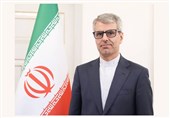Intl. Aid Groups Urge Resumption of Funding for Yemen
TEHRAN (Tasnim) – International aid groups are urging the US government to resume at least some of its halted funding for Yemen, the war-torn country on the Arabian Peninsula, where a US-backed Saudi-led coalition is waging a war that has created the world's worst humanitarian crisis.
"The most significant challenge to sustained life-saving humanitarian action today is the severe shortfall in funding, which has been exacerbated by the US suspension," said the leaders of Oxfam America, the International Rescue Committee, the Norwegian Refugee Council, CARE, Save the Children and Mercy Corps, ABC News reported.
The United Nations reported this week that its pledge drive has received less than a quarter of the funds it needs for programs in the country. That lack of resources could not come at a worse time, as Yemen's currency drops even further, raising the price of food even more out of the reach of ordinary people; almost half of all children under the age of 5 are expected to be malnourished by the end of this year, the aid groups say.
Despite these dire warnings, the US Agency for International Development (USAID) has not budged since it announced in March that it would suspend its operations for areas where between 70 and 80% of Yemenis live.
The Saudi-led coalition has been accused of war crimes, including attacks on hospitals, clinics and water infrastructure. Oxfam and the Yemen Data Project reported this week that medical and water infrastructure has been hit during air raids at an average of once every ten days during the conflict -- damage that has not just killed civilians, but also disrupted access to healthcare, clean water and sanitation.
Since the coronavirus was declared a pandemic in mid-March, three quarantine centers have been hit by airstrikes, according to the Civilian Impact Monitoring Project.
While the coalition's airstrikes have caused the majority of the war's civilian casualties, the US has boosted its air power by providing midair refueling, training and by selling arms like so-called smart bombs. The Trump administration halted midair refueling in 2018, but President Donald Trump has vetoed Congress's push to end US support or block emergency arms sales.
Last week, the State Department's inspector general faulted the agency for failing to "fully assess risks and implement mitigation measures to reduce civilian casualties" when it bypassed Congress and sold the Saudis and Emiratis $8 billion in emergency arms last year.
Secretary of State Mike Pompeo rejected that finding, claiming last week that US weapons sales "prevented the loss of civilian lives." He didn't elaborate, but the top US diplomat has previously argued selling more arms to the coalition will pressure the Houthis into negotiations and protect Saudi and Emirati territory, which have been repeatedly hit by Houthi retaliatory attacks.
But that hasn't borne out. The rate of bombings more than doubled in the first half of 2020 compared to the prior six months, with nearly 40% hitting civilians or civilian infrastructure, according to aid groups. A one-sided ceasefire announced by the Saudis in April fell apart as even the coalition failed to abide by it. And amid the ongoing fighting against the Houthis, the coalition has also splintered, with Emirati-backed separatists in the south fighting pro-Hadi forces -- a divide that's continued even after a mediated settlement earlier this month.
The continued US arms sales have also made USAID's pause on assistance all the more frustrating to humanitarian groups.
"Instead of supporting Yemen in this catastrophic situation, they suspended aid for the past couple of months to an already dire situation, but they continue to sell weapons and arms to the Saudi-led coalition," said Muhsin Siddiquey, country director for Oxfam.
"They can stop the war if they seriously want," he added, instead of "fueling the crisis and war."






